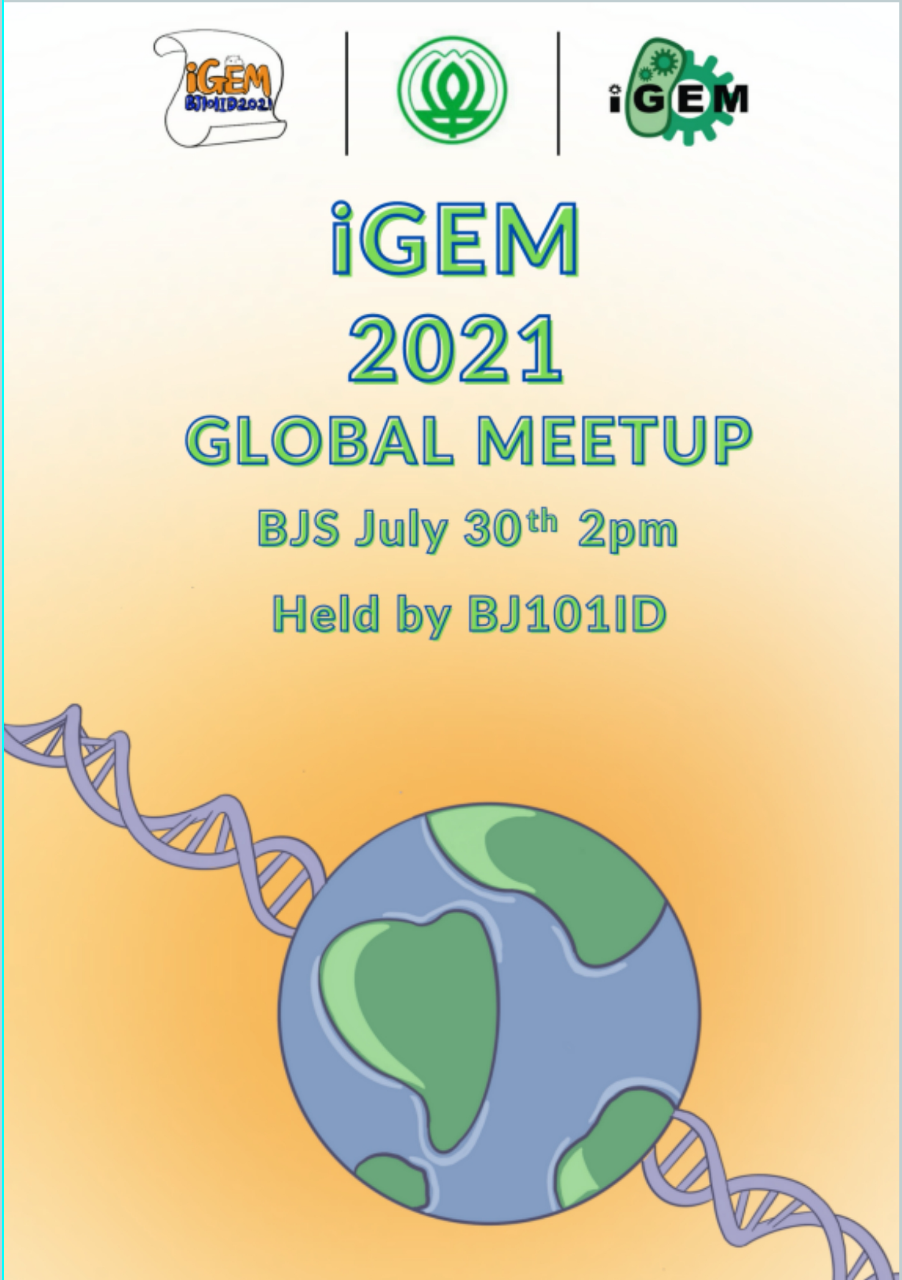Collaboration
Overview
In order to share our experiences and learn more knowledge from other teams, we joined a meetup held by iBowu-China, BJ101ID, and the CCiC Conference this year. These collaborations not only offered us:
1) chances to refine our project but also inspired our future experimental design and topic selection that have long-term benefits for our team. 2) knowledge about recent developments in synthetic biology and useful tools in molecular biology.
Also, we offered help to other teams by offering them plasmids or mentoring them.
1) chances to refine our project but also inspired our future experimental design and topic selection that have long-term benefits for our team. 2) knowledge about recent developments in synthetic biology and useful tools in molecular biology.
Also, we offered help to other teams by offering them plasmids or mentoring them.
CCiC Conference

Figure 1:The logo of CCiC 2021 (CCiC organizing committee, 2021)
Due to the epidemic, BNDS China 2021 attended the 8th China Regional iGEMer Exchange Conference (CCiC Conference) online. The conference was jointly organized by Shanghai Genetics Society, Yunfeng Foundation, Suzhou Biomedical Industrial Park, State Key Laboratory of Genetic Engineering, and School of Life Sciences, Fudan University in an online format from August 27 to August 29, 2021.
After the presentation, we went into the questioning area after the presentation. We had a fantastic time speaking with the volunteers while waiting for the questions because our presentation was rather early. Through the CCiC conference, we received a lot of helpful advice from the professors, such as our project is a bit complicated, and incapable of functioning in prokaryotes. Besides, we also commented and gave advice to other groups from our own perspectives.
The CCiC exchange session included a poster presentation, team presentations, and Q&As. The team held an internal meetup before the poster session for team members to brainstorm and exchange ideas. We demonstrated our design and result during the presentation process, and learned from the experience of the previous poster production, then finalized the PowerPoint with the support of artwork. From the presentation part, we received an awesome chance of getting familiar with and mocking the final presentation, also split and analyzed the logic of our project.

On April 18th, 2021, we joined the offline meetup held by iBowu-China in Beijing to share our project design with other teams. Our safe, environmentally friendly approach to biosurfactant production gain praise from teachers and students. While inspiring others with our project design, we also received some crucial suggestions for improvement. For example, we used to select evolved strains by fluorescence intensity, but the judge suggested that we could fuse rhamnose promoter with antibiotic-resistance gene since that could make our selection’s mechanism more similar to natural selection. We accepted this advice and applied it in our project and find that such a method indeed increased our projects’ theoretical efficiency.
After the presentation session, we are especially interested in QHFZ’s project, so we had further discussion with them, through which we learned how to transport Lyophilized strains (which is originated from their previous project) and we also taught them how to intensively read a paper. After the meetup, we build up a WeChat group and kept communicating and helping each other till now.
Offline meeting with iBowu-China


Fig 2: the poster of offline meetup held by iBowu-China
Fig 3: our presentation during the offline meetup held by iBowu-China
On July 30th, 2021, we joined the online meetup held by BJ101ID. At the beginning of the meetup, the adviser of BJ101ID, Tianze Zhu, make a speech that told us the spirit of iGEM and encouraged us to devote ourselves to synthetic biology research in the future.
During the meetup, we presented our improved project and inspired other teams to use directed evolution in their future projects. We also actively joined the question session and asked many crucial questions to inspire other teams.
Online meetup with BJ101ID


Fig 4: the poster of the online meetup held by BJ101ID
Fig 5: group photo of the online meetup held by BJ101ID
As a team with a 5-year history, we build up our own plasmid depository and offer plasmid to other schools freely when they need it.
Plasmid delivery
Plasmid delivered to QHFZ
We offered QHFZ two plasmids of three genes: FMO, UGT, and BGL originated from our previous project, which are crucial for indigo synthesis.
We offered QHFZ two plasmids of three genes: FMO, UGT, and BGL originated from our previous project, which are crucial for indigo synthesis.
Plasmid delivered to iBowu-China & CKWA-China
We offered iBowu-China a plasmid with sfGFP, J23110 promoter, and pSB1C3 backbone originated from the iGEM distribution kit in 2016. iBowu-China transferred this plasmid to CKWA-China later for the purpose of CKWA-China’s education program.
We offered iBowu-China a plasmid with sfGFP, J23110 promoter, and pSB1C3 backbone originated from the iGEM distribution kit in 2016. iBowu-China transferred this plasmid to CKWA-China later for the purpose of CKWA-China’s education program.
Plasmid delivered to BIT-China
We offered BIT-China a plasmid with mTagBFP, which originated from the iGEM distribution kit in 2016.
We offered BIT-China a plasmid with mTagBFP, which originated from the iGEM distribution kit in 2016.
Our instructor, Tingzhen Liu, joined the mentorship program and mentor Nanjing_NFLS this year. He helped Nanjing_NFLS to refine project, solve synthetic biology problems as well as reach medal criteria. This mentorship offered Nanjing_NFLS precious knowledge and experience, while promoted partnership between BNDS_China and Nanjing_NFLS
Mentorship to Nanjing_NFLS
Collaboration with Links_China
We want to thanks Qidang Ye from Links_China for offering their microplate reader for our quantificative mesurements. In return, our instructor Tingzhen Liu also helped with their hardware construction.
We want to thanks Qidang Ye from Links_China for offering their microplate reader for our quantificative mesurements. In return, our instructor Tingzhen Liu also helped with their hardware construction.


